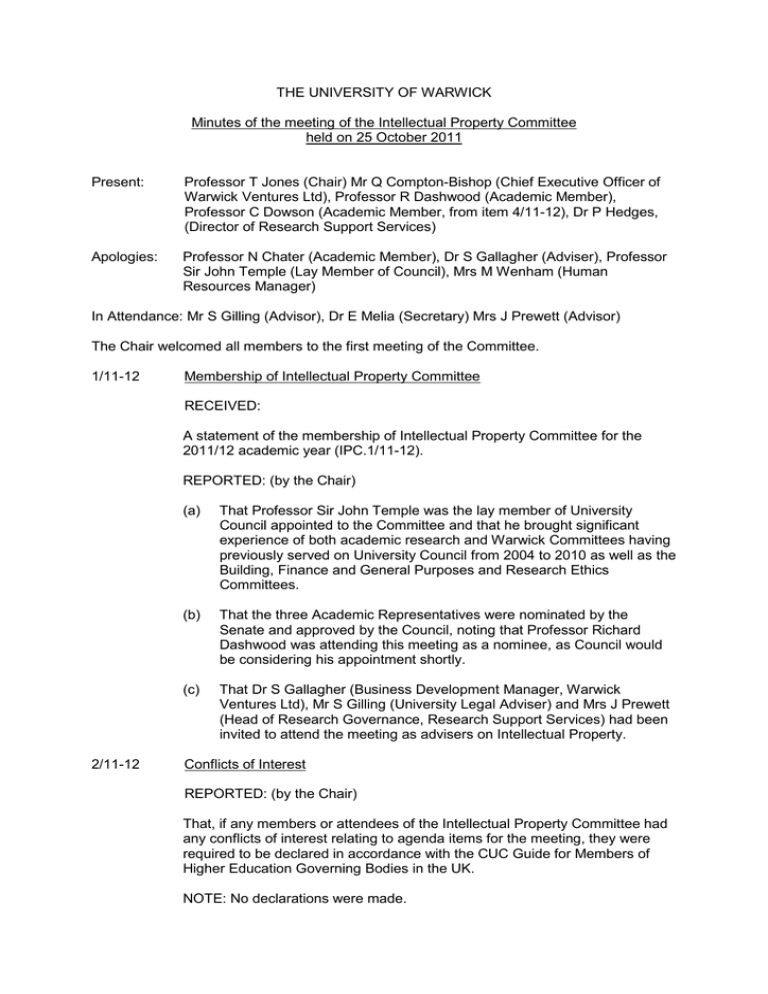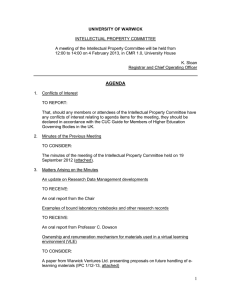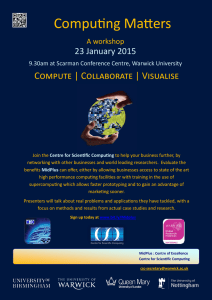THE UNIVERSITY OF WARWICK held on 25 October 2011
advertisement

THE UNIVERSITY OF WARWICK Minutes of the meeting of the Intellectual Property Committee held on 25 October 2011 Present: Professor T Jones (Chair) Mr Q Compton-Bishop (Chief Executive Officer of Warwick Ventures Ltd), Professor R Dashwood (Academic Member), Professor C Dowson (Academic Member, from item 4/11-12), Dr P Hedges, (Director of Research Support Services) Apologies: Professor N Chater (Academic Member), Dr S Gallagher (Adviser), Professor Sir John Temple (Lay Member of Council), Mrs M Wenham (Human Resources Manager) In Attendance: Mr S Gilling (Advisor), Dr E Melia (Secretary) Mrs J Prewett (Advisor) The Chair welcomed all members to the first meeting of the Committee. 1/11-12 Membership of Intellectual Property Committee RECEIVED: A statement of the membership of Intellectual Property Committee for the 2011/12 academic year (IPC.1/11-12). REPORTED: (by the Chair) 2/11-12 (a) That Professor Sir John Temple was the lay member of University Council appointed to the Committee and that he brought significant experience of both academic research and Warwick Committees having previously served on University Council from 2004 to 2010 as well as the Building, Finance and General Purposes and Research Ethics Committees. (b) That the three Academic Representatives were nominated by the Senate and approved by the Council, noting that Professor Richard Dashwood was attending this meeting as a nominee, as Council would be considering his appointment shortly. (c) That Dr S Gallagher (Business Development Manager, Warwick Ventures Ltd), Mr S Gilling (University Legal Adviser) and Mrs J Prewett (Head of Research Governance, Research Support Services) had been invited to attend the meeting as advisers on Intellectual Property. Conflicts of Interest REPORTED: (by the Chair) That, if any members or attendees of the Intellectual Property Committee had any conflicts of interest relating to agenda items for the meeting, they were required to be declared in accordance with the CUC Guide for Members of Higher Education Governing Bodies in the UK. NOTE: No declarations were made. 3/11-12 Terms of Reference CONSIDERED: The Terms of Reference for the Intellectual Property (IP) Committee, a joint committee of Senate and Council (IPC.2/11-12). REPORTED: (by the Chair) That any proposed future business for the Committee would be considered against with reference to the Committee’s remit as set out in its Terms of Reference to ensure that the Committee was the appropriate forum for discussion and/or decisions. RESOLVED: That the Terms of Reference be adopted and approved as set out in paper IPC.2/11-12. 4/11-12 Role of Warwick Ventures Ltd in University Intellectual Property RECEIVED: A presentation on the role of Warwick Ventures Ltd (WVL) in identifying, protecting and managing University Intellectual Property given by the CEO of Warwick Ventures Ltd noting in particular: (a) That WVL had responsibility for technology transfer and commercialisation, helping to generate impact from the University’s Intellectual Property rights (UIPR), enhancing the University’s reputation and generating a financial return, noting that the latter was not their first priority. (b) That the services of WVL were agreed in their Governance and Service Agreement of August 2011 and included advising on and developing UIPR opportunities, managing, protecting and exploiting UIPR as well as technology commercialisation and spin-out support services. (c) That WVL role in technology commercialisation included: (i) identifying and appraising UIPR, (ii) negotiating arrangements with owners and funders of UIPR, (iii) managing the University’s patent portfolio, (iv) initiating and managing development agreements, (v) obtaining grants and proof of concept funding for inventions, (vi) marketing and commercialising UIPR through licences and spinout companies, and (vii) collecting and distributing income 2 (d) (e) (f) That WVL supported academics with the formation of spin-out companies through: (i) Finding or providing management, staff, facilities and finance, (ii) Ensuring that shares and other securities were issued to academics and the University, and (iii) Monitoring and managing the University’s interests in spin-out companies. That WVL key performance indicator data submitted to the HEFCE Higher Education Business and Community Interaction (HEBCI) 2010/11 survey showed: (i) That 78 new innovation disclosures were made, equalling the figure for the previous year and the target for 2011/12 was 80. (ii) That the University had 50 granted active patents and 52 active and assigned licences and that previously these statistics had been underreported as the number of patent/licence families, when actually each national patent and each national licence should have been counted individually, accounting for a significant increase between the 2009/10 (22 and 9 respectively) and 2010/11 data. (iii) That the level of spin-out creation had remained steady for the past three years, noting that Warwick had launched a total of approximately 70 spin-outs with just under half still surviving. (iv) That licence income was very low (£140k) and WVL had set ambitious targets over the coming five years to grow the annual income to £500k by 2015. (v) That historically, sales of spin-outs had always been low, but that effort would be focussed on achieving greater proceeds in the future, although targets set in this area were speculative. That HEBCI data available for 2009/10 allowed comparison with UK universities with similar levels of research funding which showed: (i) That the University had a comparable number of disclosures and patent filings to similarly funded institutions. (ii) That, even taking into consideration Warwick’s previous underreporting, the University had a comparatively small patent portfolio, but that historically it had also had a low patent budget. (iii) That Warwick also had a relatively small number of active licences and consequently a low licence income. (iv) That across the sector, patent costs were not always proportional to patent portfolio or licence income. 3 (v) (g) That historically, the University had channelled more UIPR into spin-outs than the sector norm and hence Warwick compared more favourably on the number of spin-outs created as well as their total turnover and investment. That the patent budget for 2011/12 onwards was significantly greater than in previous years, but that it was still vital that inventions were assessed carefully to ensure that they were worthy of patenting. REPORTED: (by the CEO of Warwick Ventures Ltd) 5/11-12 (a) That it was anticipated that in the future the balance would move towards greater volumes of licencing deals, rather than spin-outs as these were less labour intensive and had a shorter payback timeframe, noting that WVL would still pursue the formation of spin-out companies where this was the most obvious route to commercialisation. (b) That, in cases where WVL decided not to patent an invention or to discontinue patent protection, the inventor had the right to approach the Registrar for permission to have the invention or patent assigned to themselves and to continue to protect and exploit the technology outside of the University, noting that the terms of the arrangements could require the inventor to retrospectively repay a percentage of any patent costs to date. Role of Research Support Services Contracts Team in University Intellectual Property RECEIVED: A paper on Research Support Services (RSS) Intellectual Property Principles and Guidelines (IPC.13/11-12, tabled at the meeting) presented by Mrs J Prewett noting in particular: (a) That the basic principle regarding ownership of Intellectual Property Rights (IPR) was that it was owned by the employer when created by an employee in the normal course of their employment. (b) That University staff are contractually required to disclose inventions and participate in applications for protection, while the University takes responsibility for protection, development and exploitation of the IPR. (c) That RSS sought to retain foreground IP (IP generated for a contractual arrangement), granting a licence to the funder, which may be limited by field, exclusive or nonexclusive, non-royalty or royalty bearing or based on revenue sharing, noting that provision may be made for revocation of the licence in the eventuality that the licensee does not reasonably exploit the IP. (d) That where foreground IP was assigned to a funder, the agreement generally included provision of a back licence for research and teaching purposes, rights to publish subject to confidentiality and approval, a royalty or revenue share clause and the scope for requesting reassignment in the event that the funder did not wish to continue to use or exploit the IP. 4 (e) That the University generally granted funders and partners a royalty-free licence to Background IP for the Project only. (f) That the primary aim of RSS in this regard was to protect the University and its academic staff to be able to continue and build on research, ensuring that no research agreement unnecessarily or unfairly impeded their academic freedom and did not breach the University’s charitable objectives or contravene State Aid rules. (g) That every agreement was dealt with on a case by case basis, noting that IP was negotiated as one aspect of the overall funding agreement and not in isolation. (h) That the five RSS Contracts Officers were largely organised by Faculty and attempted to negotiate with funders starting from the University’s standard terms, noting that generally funders preferred to negotiate on their own terms. (i) That the most common contractual difficulties were industrial contracts where the price was significantly below full economic cost and contracts in which the funder’s requirements were disproportionate to their contribution to the project. (j) That RSS were working on agreeing standard terms with funders for repeat contracts, an example of which was the recently adopted ‘Short Form Contract’ which originated to expedite WMG contracts for small pieces of commercially funded research. REPORTED: (by the Director of RSS) (a) That, in negotiating research contracts, there were tensions between the cost, price and ownership of IP which had to be managed. (b) That IPR had been an issue for negotiation in a number of research agreements. (c) That there were some standard agreements available for use by UK universities, although funders often insisted on negotiating on their own terms. (d) That it might be possible to survey the Russell Group to understand Members’ positions on IPR with external Sponsors, noting that Members might consider their IP Policy as commercial in confidence. (by Professor R Dashwood) (e) That the priority of most academic staff was to be able to publish research, rather than to retain total ownership of IPR. (f) That clear guidance on IPR policy needed to be communicated to academic staff to assist in negotiations with potential commercial collaborators. 5 6/11-12 University Intellectual Property Regulations and Policy CONSIDERED: (a) A draft policy on Information dissemination and IP (IPC.3/11-12) prepared by the previous Director of Warwick Ventures, Ederyn Williams. (b) A redrafted Regulation 28 covering IPR (IPC.4/11-12) prepared by Simon Gilling and SGH Martineau. (c) The existing University Regulation 28 covering the Patenting and Commercial Exploitation of Research Results (IPC.5/11-12). REPORTED: (by the University Legal Advisor) (a) That the existing University Regulation 28 (IPC.5/11-12), governing the patenting and commercial exploitation of research results, had been reviewed by the Research Committee (RC.23/07-08) as it had been felt that it did not make provision for a number of groups of potential creators of Intellectual Property and did not adequately cover certain circumstances in which disputes over ownership of IP might arise, for example, academic teaching materials and student ownership. (b) That subsequently, the University’s Legal Adviser had commissioned Des Burley, an IP lawyer and partner at Martineau to redraft the Regulation, on which Warwick Ventures, Human Resources, Research Support Services, the Academic Office and the Library were consulted. (c) That it was necessary for Regulation 28 to be revised and approved in order to deal with disputes over IP ownership and as a foundation for the IP Committee to develop an IP Policy and accompanying guidance for use in the University. (by Mrs J Prewett) (d) That the draft IP Policy tabled (IPC.3/11-12) had been written by Dr Ederyn Williams, the previous CEO of Warwick Ventures Ltd and that the document collated a number of other Universities’ IP Policy documents as published on their webpages. (e) That this Policy had been considered and revised by the informal IP working group which had met in the early part of 2011, but that it had not been progressed beyond that group. (f) That the IP Policy tabled had been written to cover the scope of both an IP Policy and the Regulation itself. (g) That it would be important for the Committee to consider the implications of the proposed changes to Regulation 28 and how these would be communicated to the academic community as well as in University publicity materials, such as the prospectus. 6 (by the Director of RSS) (h) That the redrafted Regulation 28 effectively dealt with the issues of ownership of IP and that it was a priority that the revision was approved to bring the new Regulation into practice and provide a basis for resolving any future issues. (by the CEO of Warwick Ventures Ltd) (i) That WVL and RSS would need to consider examples of test cases of IP ownership dispute to ensure that all foreseeable scenarios are clearly dealt with by the redrafted Regulation 28. (by Professor R Dashwood) (j) That the revised Regulation alone would not change the academic culture regarding disclosure of inventions to WVL and that further awareness raising of IP rights and responsibilities was required across the academic community at Warwick. (k) That the revised Regulation 28 currently required disclosure of Creative Output to the Registrar and that WVL might be incorporated here. (by Professor C Dowson) (l) That guidance was required for academics on how to determine what needed to be reported as a potentially exploitable invention and who to report this to, noting that the accompanying procedures on IP would need to clearly signpost academics to WVL for advice and guidance. (by the Chair) (m) That input would be required from HR regarding the strategy for dissemination of the IP Policy when it was drafted following any approved revisions to Regulation 28. RESOLVED: (a) That the Committee submit comments and suggested changes to the redrafted Regulation 28 to the Committee Secretary by 8 November for consideration by the Chair and Mr S Gilling with a view to seeking the necessary formal approval so that Regulation 28 may be brought into force as soon as possible. (b) That the revised Regulation 28 would replace in its entirety the existing Regulation 28 as set out in IPC.5/11-12. NOTE: Following the meeting the Chair, on behalf of the Committee and following consultation with the University Legal Advisor and SGH Martineau approved further revisions to Regulation 28 covering Intellectual Property Rights. It was agreed by the Chair that the revised Regulation 28 would be considered by the Steering Committee prior to seeking approval from both the Senate and the Council. 7



